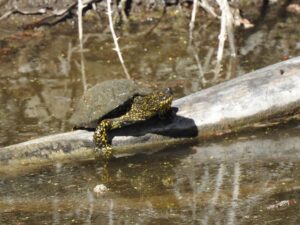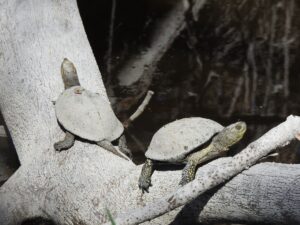The European pond turtle in the Vallée des Baux
The European pond turtle (cistude), a worrying status
 More than a year ago, we announced the start of a study in the Vallée des Baux on the European pond turtle, this timid aquatic turtle. It is currently threatened in several regions of its range, mainly due to the destruction of wetlands.
More than a year ago, we announced the start of a study in the Vallée des Baux on the European pond turtle, this timid aquatic turtle. It is currently threatened in several regions of its range, mainly due to the destruction of wetlands.
It is thus classified as “near threatened” on the world red list of threatened reptiles.
Why this study?
In the Vallée des Baux, only two studies have been carried out on this species since the 2000s, both by A Rocha, and only in the Ilon marsh. Nevertheless, it was thought that other populations were probably present in the valley, as attested by numerous spot observations in recent years. Moreover, as the area has undergone significant changes in recent years, the question arises of the health of these populations and the links between them. The objective of this study was therefore twofold: on the one hand, to locate and gain a better understanding of the other populations outside the Ilon marsh, and on the other hand, to assess the extent to which the valley’s extensive network of canals and irrigation ditches enables the different populations to be linked together, a sine qua non condition for their survival.
Covering the distance in the Vallée des Baux
 Thanks to the help of ten motivated observers, field monitoring was carried out from April to July, despite the health crisis. These surveys were carried out on 189 100-metre transects, which were walked two or three times during the study, covering a total of more than 45 km! This was an unprecedented research effort in the area.
Thanks to the help of ten motivated observers, field monitoring was carried out from April to July, despite the health crisis. These surveys were carried out on 189 100-metre transects, which were walked two or three times during the study, covering a total of more than 45 km! This was an unprecedented research effort in the area.
Beforehand, we had to obtain the authorisation of about fifteen landowners in order to be able to carry out observations on sites identified as favourable for the turtle. Some of them even provided us with valuable information by telling us about past sightings of this species: thank you to them!
Time for an assessment
 Our results have enabled us to refine our knowledge of the turtle populations: this species is indeed present on many sites where it was known or suspected in the Vallée des Baux. New population nuclei have been discovered, and two others are presumed to be extinct. In addition, the hydrographic network was found to be well connected and without discontinuity.
Our results have enabled us to refine our knowledge of the turtle populations: this species is indeed present on many sites where it was known or suspected in the Vallée des Baux. New population nuclei have been discovered, and two others are presumed to be extinct. In addition, the hydrographic network was found to be well connected and without discontinuity.
This is good news for the future of the pond turtle in the Vallée des Baux! Nevertheless, our analyses allow us to make several management recommendations. They would make it possible to improve the sustainability, development and connectivity of the various nuclei identified: restoration of riparian zones and wetland habitats, with appropriate management of the banks of the channels.
This study also opens up new avenues of exploration, in order to confirm the presence of the turtle in certain sectors that were inaccessible during the study.
What is certain is that the turtle has not yet revealed all its secrets…
You can consult the complete study (in French only) by clicking here.
This study was commissioned by the Camargue Regional Nature Park, and financed by the European Union and the Southern Region, as part of the management of the Natura 2000 site of the marshes of Arles and the Vallée des Baux.
